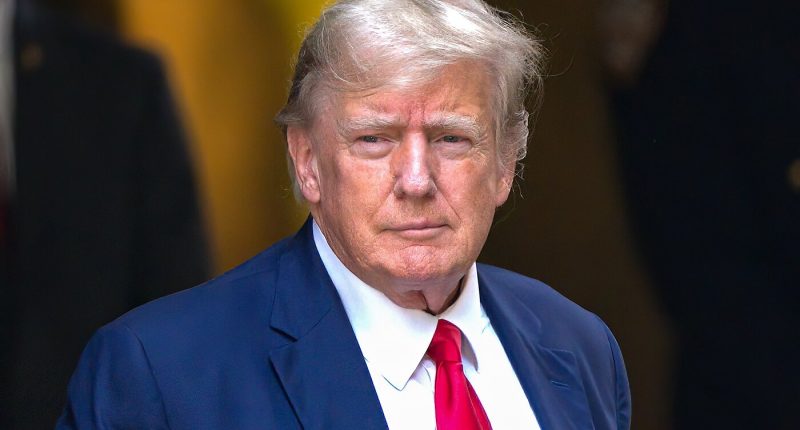Donald Trump has been found guilty of conspiring to buy the silence of a porn actor days before the 2016 election and covering his tracks in business records, becoming the first former US president to be convicted of a crime as he seeks a second term in office.
The unanimous verdict in the Manhattan “hush money” case came at just after 5pm local time on Thursday, after almost two days of deliberation by the seven men and five women of the jury.
The historic conviction is a vindication for Manhattan’s Democratic district attorney Alvin Bragg, who brought the case last year after it had been abandoned by his predecessor and federal prosecutors.
Over the course of five weeks, jurors had sat rapt as they heard from one-time prominent figures in Trump’s orbit, who outlined a “catch and kill” scheme to suppress a story of an alleged extramarital encounter with Stormy Daniels, after she threatened to go public with her tale.
Trump, who had been forced off the campaign trail four days a week to attend the trial in person, sat with his eyes closed while the verdict was read out by the jury foreman, an Irish-born salesman from Harlem, to a hushed courtroom.
Proceedings ended abruptly moments later, at which point Trump shook hands with his son Eric, who patted his father on the back. Outside the courtroom, Trump denounced the “rigged, disgraceful trial”.
“I’m a very innocent man,” he said. “I’m fighting for our country. I’m fighting for our Constitution . . . I think it’s just a disgrace. And we’ll keep fighting, we’ll fight till the end and we’ll win because our country has gone to hell.” He added: “The real verdict is going to be [on] November 5 by the American people.”
Trump is set to be sentenced on July 11, four days before the start of the Republican convention, where he will be crowned the party’s nominee.
Speaking after the verdict, Bragg said: “A jury of 12 everyday New Yorkers was presented with overwhelming evidence — including invoices, cheques, bank statements, audio recordings, phone logs, text messages and direct testimony from 22 witnesses.”
The evidence proved Trump “went to illegal lengths to lie repeatedly in order to protect himself and his campaign”, he added. The 34 counts on which Trump was convicted carry a maximum prison sentence of four years each, but as a first-time offender, he is unlikely to be incarcerated.
Bragg declined to say whether he would seek a prison sentence. Trump is also likely to appeal against the verdict to New York’s higher courts, but that process would take several months and would not prevent him, if elected, from going down in history as the first convicted felon to be the US’s commander-in-chief.
Nothing in the US Constitution prohibits a convicted criminal from holding office. If re-elected president, Trump would not be able to pardon himself, as that power lies with the New York governor when it comes to charges brought by state, rather than federal, prosecutors.
Despite weeks-long round-the-clock coverage of the Manhattan trial, Trump is riding high in the presidential election polls, and is consistently leading President Joe Biden in crucial swing states. He has also been successful in delaying the three other criminal cases he faces, over alleged attempts to frustrate the results of the 2020 election and the retention of classified documents after his departure from office. None are likely to go to trial before November’s vote.
The Manhattan district attorney’s office fought off multiple attempts by Trump to delay the trial or disqualify testimony, ultimately calling witnesses including former aide Hope Hicks, former tabloid publisher David Pecker, and former Trump fixer Michael Cohen, now his avowed foe.
Cohen, who paid $130,000 to adult entertainment star Daniels in the days before Trump first won the White House, said he had conspired with the then-candidate to fraudulently disguise the reimbursements for that sum as payments for legal services.
Prosecutors argued that this amounted to an attempt to “corrupt” the election by a candidate who was already damaged by the release of the Access Hollywood tape, in which he was heard bragging about grabbing women’s genitals, and was fearful of how voters would react to the revelation of an extramarital sexual encounter with Daniels.
Trump’s defence had maintained that there was “no evidence” their client was aware of the alleged scheme. The 77-year-old’s lawyers also poured scorn on Cohen, a Trump acolyte turned arch-enemy who was the only witness to tie Trump directly to the repayment scheme.
Trump attorney Todd Blanche told the jurors during closing arguments on Tuesday that they could not convict his client purely on the testimony of Cohen, a convicted perjurer and fraudster who he claimed had “raised his right hand and . . . lied to each of you” and who he said was the “human embodiment of reasonable doubt”.
Outside the courthouse in lower Manhattan, people streamed into a nearby park after the verdict was announced, in a scene reminiscent of the spontaneous celebrations across the city when Trump was defeated four years ago.
Later, there were testy scenes outside the courthouse as protesters confronted one another. The Biden campaign, which until this week had largely shied away from commenting on the trial, released a statement after the verdict saying it demonstrated that “no one is above the law”. “Donald Trump has always mistakenly believed he would never face consequences for breaking the law for his own personal gain,” the campaign said.
“But today’s verdict does not change the fact that the American people face a simple reality. There is still only one way to keep Donald Trump out of the Oval Office: at the ballot box.” A White House spokesperson issued a one-sentence statement: “We respect the rule of law, and have no additional comment.”
Source: Financial Times





